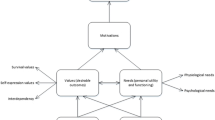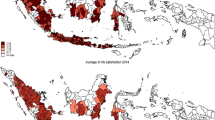Abstract
This paper explores factors affecting individual goal satisfaction in Bangladesh and Thailand. Analysing the determinants of goal satisfaction in two countries at different levels of development enables the paper to address the broader question of whether the common practice of classifying goals as ‘universal’ (e.g. health) or ‘local’ (e.g. community relationships) has any empirical support. The study uses data from communities in Thailand and Bangladesh that were researched from 2002 to 2007 by the Economic and Social Research Council’s Wellbeing in Developing Countries Research Group at the University of Bath. Results from the study based on regression analysis show that universal and local goals have the same determinants, supporting the view that they are interdependent. The implications of this finding are that both types of goals should be given equal priority and need to be taken into account to better understand people’s wellbeing. This finding is, however, moderated by the second finding of the paper, which is that socio-economic variables and the extent of need satisfaction play different roles in explaining goal satisfaction in countries at different stages of development. For example, whilst in Bangladesh wealth only contributes to goal satisfaction if it increases needs satisfaction, in Thailand it has an independent effect. The implications of both findings for global frameworks such as the Millennium Development Goals are addressed in the conclusions.
Similar content being viewed by others
Notes
See Sen (1984) and http://www.ophi.org.uk/.
The correlation coefficient between the wealth index and the type of roof of the house was 0.55 in Bangladesh and 0.31 in Thailand, which suggests that the index is capturing the economic level of the household. Factor scores derived from using principal component analysis on the asset items and forcing a one-factor solution were also positively correlated with the wealth index (0.67 in Bangladesh and 0.40 in Thailand). The difference in the correlation coefficient between Thailand and Bangladesh might reflect the limitations of a cross-nationally comparative questionnaire in capturing culturally specific assets.
In addition to the OLS model, an ordered probit model was used for the goal variables. The results were quite similar using both models.
References
Ahuvia, A. (2008). If money doesn’t make us happy, why do we act as if it does? Journal of Economic Psychology, 29, 491–507.
Aknin, L. B., Barrington-Leigh, C. P., Dunn, E.W., Helliwell, J. F., Biswas-Diener, R., Kemeza, I., Nyende, P., Ashton-James, C., & Norton, M. I. (2010). Prosocial spending and well-being: Cross-cultural evidence for a psychological universal. Harvard Business School Working Paper 11-038.
Alkire, S., & Santos, M. E. (2010). Acute multidimensional poverty: A new index for developing countries. UNDP HDR Background Paper.
Baron, R. M., & Kenny, D. A. (1986). The moderator-mediator variable distinction in social psychological research: Conceptual, strategic and statistical considerations. Journal of Personality and Social Psychology, 51, 1173–1182.
Brinkerhoff, M. B., Fredell, K. A., & Frideres, J. S. (1997). Basic minimum needs, quality of life and selected correlates: Explorations in villages in northern India. Social Indicators Research, 42, 245–281.
Bulloch, H. (2011) Contending developments: Local notions of development on Siquijor Island, Philippines. Journal of International Development (in press). doi: 10.1002/jid.1818).
Camfield, L. (2006). Why and how of understanding ‘subjective’ well-being: Exploratory work by the WeD group in four developing countries. Well-being in Developing Countries Working Paper 26.
Camfield, L., Guillen-Royo, M., & Velazco, J. (2010). Does need satisfaction matter for psychological and subjective wellbeing in developing countries: A mixed-methods illustration from Bangladesh and Thailand. Journal of Happiness Studies, 11(4), 497–516.
Camfield, L, Masae, A., McGregor, J. A., & Promphaking, B. (2012). Cultures of aspiration and poverty? Aspirational inequalities in northeast and Southern Thailand. DEV working paper series #38.
Caporale, G. M., Georgellis, Y., Tsitsianis, N., & Ping Yin, Y. (2009). Income and happiness across Europe: Do reference values matter? Journal of Economic Psychology, 30, 42–51.
Clark, D. A. (2000). Visions of development: A study of human values. UK: Edward Elgar.
Copestake, J. (2011). Well-being in development: Comparing global designs with local views in Peru. European Journal of Development Research, 23, 94–110.
Di Tella, R., Haisken-De New, J., & MacCulloch, R. (2010). Happiness adaptation to income and to status in an individual panel. Journal of Economic Behavior & Organization, 76(3), 834–852.
Diener, E., Ng, W., Harter, J., & Arora, R. (2010). Wealth and happiness across the world: Material prosperity predicts life evaluation, whereas psychosocial prosperity predicts positive feeling. Journal of Personality and Social Psychology, 99(1), 52–61.
Dolan, P., Peasgood, T., & White, M. (2007). Do we really know what makes us happy? A review of the economic literature on the factors associated with subjective well-being. Journal of Economic Psychology, 29, 94–122.
Dorward, A., & Unterhalter, E. (2012). Development concepts and principles for new ‘MDGs’ in a post-2015 World? Social Indicators Research (forthcoming).
Doyal, L., & Gough, I. (1991). A theory of human need. London: Macmillan.
Gough, I. (2004). Human well-being and social structures: Relating the universal and the local. Global Social Policy, 4(3), 289–311.
Gough, I., & McGregor, J. A. (Eds.). (2007). Wellbeing in developing countries: New approaches and research strategies. Cambridge: Cambridge University Press.
Gough, I., Wood, G., Barrientos, A., Bevan, P., Davis, P., & Room, G. (2004). Insecurity and welfare regimes in Asia, Africa and Latin America: Social policy in development contexts. Cambridge: Cambridge University Press.
Greene, W. H. (2000). Econometric analysis. UK: Prentice-Hall.
Guillen-Royo, M. (2008). Consumption and wellbeing: Motives for consumption and needs satisfiers in Peru. Unpublished PhD thesis, University of Bath.
Guillen-Royo, M. (2011). Reference group consumption and the subjective wellbeing of the poor in Peru. Journal of Economic Psychology, 32(2), 259–272.
Guillen-Royo, M., & Velazco J. (2005). Exploring the relationship between happiness, objective and subjective wellbeing: Evidence from rural Thailand. Paper presented at the capabilities and happiness conference 16–18 June 2005.
Heissler, K. (2011). ‘We are poor people so what is the use of education?’ Tensions and contradictions in girls’ and boys’ transitions from school to work in rural Bangladesh. European Journal of Development Research, 23, 729–744.
Hinks, T., & Davies, S. (2008). Life satisfaction in Malawi and the importance of relative consumption, polygamy and religion. Journal of International Development, 20, 888–904.
Jackson, M. (2011). Life within limits: Well-being in a world of want. Durham: Duke University Press.
Knight, J., & Gunatilaka, R. (2010). The rural-urban divide in China: Income but not happiness? The Journal of Development Studies, 46(3), 506–534.
Langer, S., & Hojlund, S. (2012). An anthropology of welfare: Journeying towards the good life. Anthropology in Action, 18(3), 1–9.
Lavers, T. (2008). Reconciling the needs and wants of respondents in two rural Ethiopian communities. Social Indicators Research, 86(1), 129–147.
Lo Bue, M. C., & Klasen, S. (2012) Identifying synergies and complementarities between MDGs: Results from cluster analysis. Social Indicators Research (forthcoming).
Lyubomirsky, S., King, L. A., & Diener, E. (2005). The benefits of frequent positive affect. Psychological Bulletin, 131, 803–855.
Mathews, G., & Izquierdo, C. (Eds.). (2009). Pursuits of happiness: Well-being in anthropological perspective. Oxford: Berghahn Books.
McGregor, J. (2007). Researching wellbeing: From concepts to methodology. In I. Gough & J. A. McGregor (Eds.), Wellbeing in developing countries: From theory to research (pp. 316–350). Cambridge: Cambridge University Press.
Mee-Udon, F. (2009). The contribution of universal health insurance coverage scheme to villagers’ wellbeing in Northeast Thailand. PhD dissertation. UK: University of Bath.
Melamed, C., Devlin, N., & Appleby, J. (2012). ‘Valuing development’: Could approaches to measuring outcomes in health help make development more accountable? Research reports and studies. London: Overseas Development Institute.
Møller, V., & Saris, W. E. (2001). The relationship between subjective wellbeing and domain satisfactions in South Africa. Social Indicators Research, 55(1), 97–114.
Morrison, M., Tay, L., & Diener, E. (2011). Subjective well-being and national satisfaction: Findings from a worldwide survey. Psychological Science, 22(2), 166–171.
Okafor, F. C. (1985). Basic needs in rural Nigeria. Social Indicators Research, 17, 115–125.
Sumner, A., & Tiwari, M. (2009). After 2015: What are the ingredients of an ‘MDG-plus’ agenda for poverty reduction? Journal of International Development, 21, 834–843.
Tay, L., & Diener, E. (2011). Needs and subjective well-being around the world. Journal of Personality and Social Psychology. doi:10.1037/a0023779.
Tiwari, M. (2011). Can a local agenda for a local context drive the post—MDG narrative? Presented at EADI-DSA Conference. York, September, 2011.
Veenhoven, R. (2000). The four qualities of life. Ordering concepts and measures of the good life. Journal of Happiness Studies, 1, 1–39.
Watson, D., Clark, L. A., & Tellegen, A. (1998). Development and validation of brief measures of positive and negative affect: The PANAS scales. Journal of Personality and Social Psychology, 54(6), 1063–1070.
Woodcock A. (2007). Validation of the WeDQoL-Goals-Bangladesh: Goal necessity and satisfaction scales and individualised quality of life scores: Report to the WeD team. Bath: Wellbeing in Developing Countries Research Group, University of Bath.
Woodcock, A., Camfield, L., McGregor, J. A., & Martin, F. (2009). Validation of the WeDQoL-goals-Thailand measure: Culture-specific individualised quality of life. Social Indicators Research, 94(1), 135–171.
World Bank. (2012). World development indicators, data.worldbank.org/indicator/downloaded 24/07/12.
Author information
Authors and Affiliations
Corresponding author
Rights and permissions
About this article
Cite this article
Guillen-Royo, M., Camfield, L. & Velazco, J. Universal and Local Reconciled: Exploring Satisfaction with Universal and Local Goals in Thailand and Bangladesh. Soc Indic Res 113, 627–645 (2013). https://doi.org/10.1007/s11205-013-0293-z
Accepted:
Published:
Issue Date:
DOI: https://doi.org/10.1007/s11205-013-0293-z




